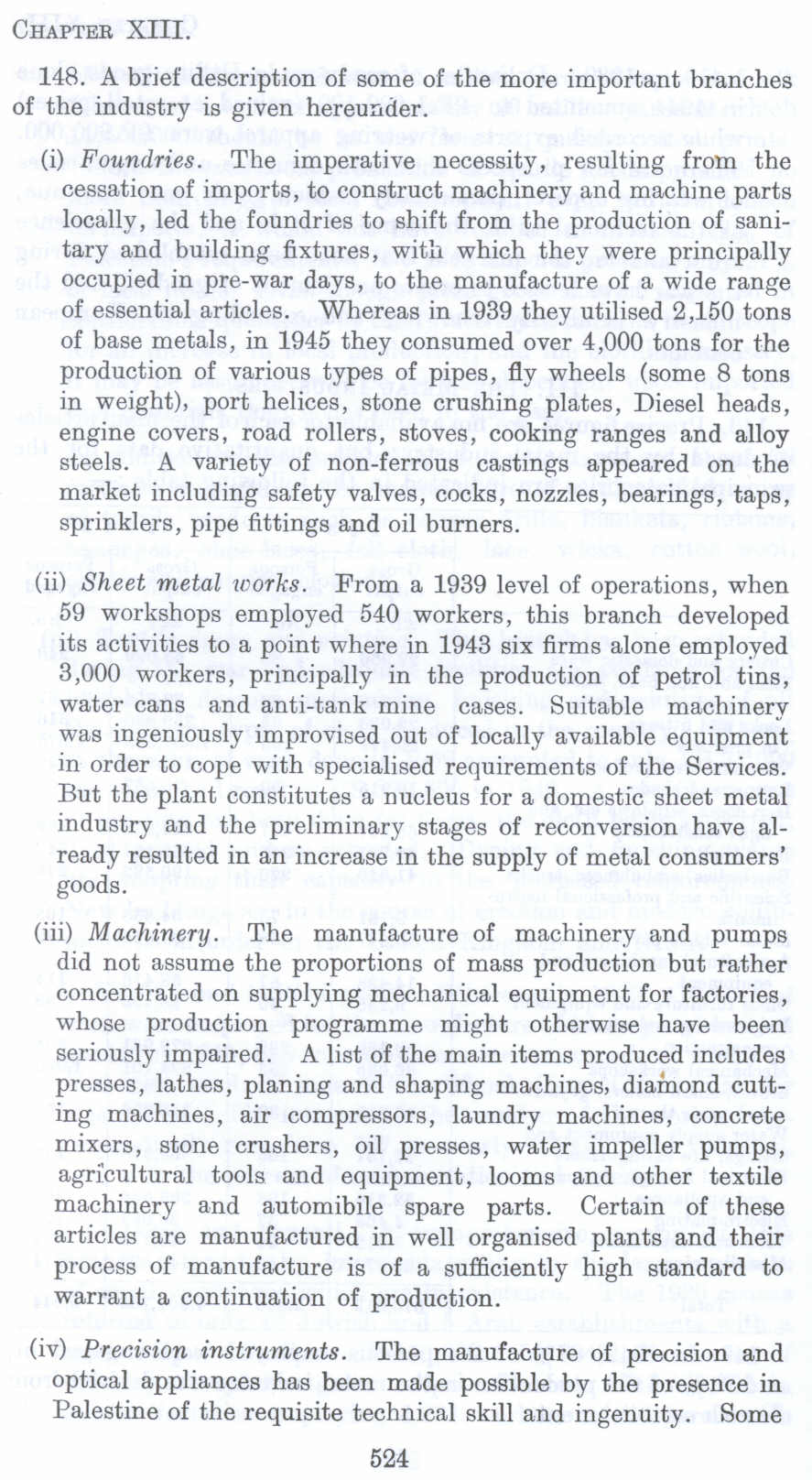| Prev | Next |  |
| Prev | Next |
| PalestineRemembered | About Us | Oral History | العربية | |
| Pictures | Zionist FAQs | Haavara | Maps | |
| Search |
| Camps |
| Districts |
| Acre |
| Baysan |
| Beersheba |
| Bethlehem |
| Gaza |
| Haifa |
| Hebron |
| Jaffa |
| Jericho |
| Jerusalem |
| Jinin |
| Nablus |
| Nazareth |
| Ramallah |
| al-Ramla |
| Safad |
| Tiberias |
| Tulkarm |
| Donate |
| Contact |
| Profile |
| Videos |
British Mandate: A Survey of Palestine: Volume I - Page 524 |
Disclaimer
The above documents, article, interviews, movies, podcasts, or stories reflects solely the research and opinions of its authors. PalestineRemembered.com makes its best effort to validate its contents.


Post Your Comment
*It should be NOTED that your email address won't be shared, and all communications between members will be routed via the website's mail server.
148. A brief description of some of the more important branches of the industry is given hereunder.
(i) Foundries. The imperative necessity, resulting from the cessation of imports, to construct machinery and machine parts locally, led the foundries to shift from the production of sanitary and building fixtures, with which they were principally occupied in pre-war days, to the manufacture of a wide range of essential articles. Whereas in 1939 they utilised 2,150 tons of has e metals, in 1945 they consumed over 4,000 tons for the production of various types of pipes, fly wheels (some 8 tons in weight), port helices, stone crushing plates, Diesel heads, engine covers, road rollers, stoves, cooking ranges and alloy steels. A variety of non-ferrous castings appeared on the market including safety valves, cocks, nozzles, bearings, taps, sprinklers, pipe fittings and oil burners.
(ii) Sheet metal works. From a 1939 level of operations, when 59 workshops employed 540 workers, this branch developed its activities to a point where in 1943 six firms alone employed 3,000 workers, principally in the production of petrol tins, water cans and anti-tank mine cases. Suitable machinery was ingeniously improvised out of locally available equipment in order to cope with specialised requirements of the Services. But the plant constitutes a nucleus for a domestic sheet metal industry and the preliminary stages of reconversion have already resulted in an increase in the supply of metal consumers' goods.
(iii) Machinery. The manufacture of machinery and pumps did not assume the proportions of mass production but rather concentrated on supplying mechanical equipment for factories, whose production programme might otherwise have been seriously impaired. A list of the main items produced includes presses, lathes, planing and shaping machines, diamond cutting machines, air compressors, laundry machines, concrete mixers, stone crushers, oil presses, water impeller pumps, agricultural tools and equipment, looms and other textile machinery and automibile spare parts. Certain of these articles are manufactured in well organised plants and their process of manufacture is of a sufficiently high standard to warrant a continuation of production.
(iv) Precision instruments. The manufacture of precision and optical appliances has been made possible by the presence in Palestine of the requisite technical skill and ingenuity. Some
Page 524